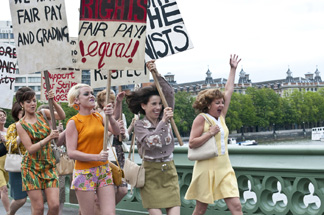Movie Review: Made in Dagenham
By Matthew Huntley
November 26, 2010
BoxOfficeProphets.com

The movie tells the real-life story of the 1968 machinist strike in Dagenham, England, where 187 female employees walked away from their jobs at the Ford automobile factory, demanding wages equal to those of men. They also sought recognition as semi-skilled employees (as opposed to unskilled), insisting their jobs of sewing interior car upholstery weren’t brainless and they shouldn’t be categorized as such on the pay grade.
Leading the charge is Rita O’Grady, played by the delightful and strong-willed Sally Hawkins, whose range becomes more evident with each picture she makes. Rita and her husband Eddie (Daniel Mays) both work at Ford, albeit in different departments, and they live in a projects-type neighborhood in walking distance of the plant, a fact that subjects them to suppositions about their class and education. When Rita asks her son’s teacher (Andrew Lincoln) to stop caning him, the teacher immediately dismisses and insults her, suggesting her simple-minded kind doesn’t have the right to question his methods.
The incident leaves Rita shaken and taken aback, prompting her to speak her mind to the Ford executives at a union meeting. Instead of sitting idle and shaking her head yes at all of her union representative’s (Kenneth Cranham) passive suggestions, she tells the men any delay in raising women’s pay and status is unacceptable. The Ford executives are stunned while her manager, Albert (Bob Hoskins), smiles with pride. Albert seems to be the only man who favors women’s equality after seeing how hard his own mum worked to support him and his brothers. He’s aware of women’s contribution and hardship.
When their requests aren’t met, Rita and her friends move to strike, something none of them have experience with. But they slowly start to gain support and their case goes all the way up to Secretary of State Barbara Castle (a fiery Miranda Richardson), who must balance her principles as a woman with her job as a government secretary, while simultaneously trying to appease Ford’s American representative (Richard Schiff), who reminds her the company is a major contributor to Britain’s economy.
There are some thoughtful and well-delivered moments in Made in Dagenham, especially when Rita corners her husband and tells him that being treated with a respect is a right, not a privilege, as well as her speech before a room full of men in black suits, telling them you always have to fight for what you believe in. Director Nigel Cole and his cast made me believe in the women’s cause, but given the circumstances of their situation, it wasn’t that hard. Maybe it’s because the women are so clearly the victims and their situation so black and white, at least to an outsider. Ford obviously discriminated against women simply because they were women - we get that, but I’m not convinced it took a narrative feature to relay the message. Because we pretty much know how the story is going to turn out, the film lacks a surprise factor and we don’t feel as emotionally tied to these women as, say, Norma Rae in Norma Rae. That film, also about abused women in the workplace, was more deeply felt and allowed us to empathize with the heroine because it put its drama before its history. It also had the luxury of being one of the first films of its kind.
The subject matter of Made in Dagenham certainly has merit, and while the film contains some fine performances, it probably would have been better suited as a documentary. After all, the movie ends with footage of the real women talking about the events, and they are every bit as interesting as the actresses portraying them, if not more. I would have rather heard from them first-hand since their fight was such an important one - it eventually led to the Equal Pay Act of 1970 and influenced other countries to adopt similar labor practices. This is engaging and relevant material for an enlightening documentary, but perhaps it lacks the drama and freshness for a narrative.